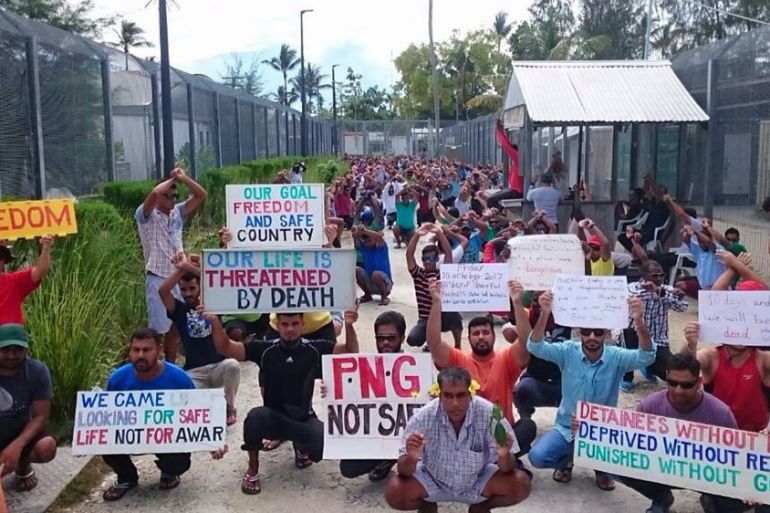Ex-New Zealand PM: Manus refugees deserve humanity
Former Prime Minister Helen Clark calls out Australia for refusing offer to take in 150 refugees on Manus Island.

Suva, Fiji – New Zealand‘s former prime minister has criticised Australia‘s treatment of refugees held on Manus Island, saying it needs to show “humanity” and allow her country to resettle some of them.
Australian Prime Minister Malcolm Turnbull has repeatedly snubbed New Zealand’s offer to take in 150 out of the 600 refugees who are currently held at detention centres on Papua New Guinea’s remote Pacific island.
Keep reading
list of 4 itemsUK police arrest three over deaths of five people in English Channel
UK passes bill to deport asylum seekers to Rwanda: What’s next?
‘Can’t give them jobs’: Rwandans grapple with fears over UK asylum plan
“Where’s the humanity?” Helen Clark, who served as prime minister from 1999-2008, told Al Jazeera on the sidelines of International Civil Society Week in the Fijian capital, Suva.
“Australia isn’t allowing New Zealand to help at all. Our offer to help has still not been accepted.”
Up until late last month, more than 300 men had barricaded themselves in at one of the decommissioned camps on the island, resisting their relocation after a series of violent attacks against refugees by locals.
The men resorted to drinking rainwater and dug their own wells in order to survive, while pleading for other countries to take them in.
Manus Island police stormed the camp on November 23 and, according to witness accounts, used long metal poles to beat the refugees before dragging them out and relocating them to another site.
|
|
“When I was prime minister, I offered Australia to take in refugees, and it was accepted,” Clark said.
“We took in many people, many Afghans, and it was one of the most successful refugee resettlements we had ever done.”
Australia has refused to resettle any refugee that arrived by boat since 2013, instead it pays Papua New Guinea and Nauru to keep them in prisons and has been searching for countries that will resettle them.
Few refugees have accepted offers to resettle in Papua New Guinea or Nauru, a tiny impoverished atoll with a population of 10,000 people.
Australia had hoped the detainees would be either resettled into Papua New Guinea society or the United States, under a controversial refugee swap, by the time the centre closed.
Under the US deal, struck with previous US President Barack Obama and bitterly criticised by his successor Donald Trump, just 54 refugees have been accepted, with 24 flown to the US.
“The situation still unfolding on Manus Island presents a grave risk of further deterioration, and of further damage to extremely vulnerable human beings,” Thomas Albrecht, the regional UNHCR representative, said in a statement.
“[We] renew [our] call for all Australian parliamentarians and leaders to take immediate action to provide protection and safety for all refugees and asylum-seekers transferred to Papua New Guinea,” he added.
‘Back door’
Clark said New Zealand would not be a “back door” to reach Australia, adding it simply “offered a way out” for a number of Manus’ distraught refugees.
“It seems the offer is not being accepted on the grounds that people will come to New Zealand, get citizenship and then travel to Australia shortly thereafter. Well, once they have a New Zealand passport they can go wherever that passport takes them. That’s their right,” she said.
“We can’t have two types of New Zealand passports, one that allows entry to Australia and the other that doesn’t.”
The UN and rights groups have for years cited human rights abuses among detainees at the detention centres.
The Papua New Guinea Supreme Court ruled in 2016 the Manus centre was illegal before ordering its closure.
However, human rights groups said the situation for refugees is far from better in New Zealand.
Amnesty International reported that some asylum seekers who had made it to New Zealand had been kept alongside remand prisoners at Auckland’s Mount Eden prison and the country’s largest jail – Rimutaka.
“There are well known negative, and at times serious physical and psychological, consequences for asylum-seekers in prison detention; there is a risk of violence with refugees and over-stayers being beaten and brutalised by other prisoners and prison guards not assisting,” Amnesty said.
Last year, a New Zealand tribunal accepted a Somali asylum seeker’s claims that he was forced to take part in a “fight club” at the Mount Eden prison.
“He was beaten by gang members and forced into gang fights against persons stronger than himself on a weekly basis,” the tribunal said.
Clark said it was unlikely that New Zealand’s decision to take in the refugees would lead to a spike in arrivals by boat.
“Very few spontaneous asylum-seekers try to reach New Zealand by boat,” she said. “We’re a very, very remote country.”
Follow Al Jazeera’s Faisal Edroos on Twitter: @FaisalEdroos